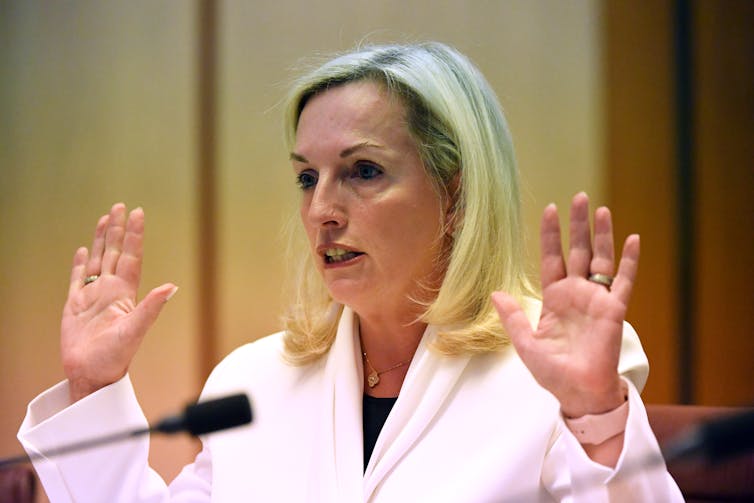Australia Post’s worst nightmare: Christine Holgate to head delivery rival Global Express
“This is the one thing we didn’t want to happen.”
That line – from the satirical British current affairs television program BrassEye – could easily be reverberating through federal government offices this week.
Yesterday the news dropped that Christine Holgate, the Australia Post chief executive pushed so roughly from her job by the Morrison government, has a new job with a rival delivery company.
Holgate resigned last November, after Prime Mnister Scott Morrison told parliament she been told to stand aside over the “optics” of rewarding four senior managers with luxury watches, worth about $20,000 – and “if she doesn’t wish to do that, she can go”.
Now Holgate has gone to a new role as chief executive of parcel-delivery competitor Global Express.
Her appointment, just a week after the expiry of her non-compete clause with Australia Post, is a gift for the new owners of Global Express, a former division of well-known Australian transport company Toll Holdings that has been struggling to find profitability.
If anyone can help turn around Global Express’s fortunes in Australia’s parcel-delivery market, Holgate can. Doing so will cost Australia Post, and Australian taxpayers.
A direct competitor
Until last month Global Express was one of three divisions of Toll Group, the Australian transport company that began in Newcastle in 1888. Its business has involved express parcel, freight delivery and domestic forwarding services in Australia, and transport and contract logistics services in New Zealand.
Toll Group was taken over in 2015 by Japan Post Holdings, the publicly traded company that runs Japan’s postal service. The acquisition was part of Japan Post’s strategy to diversify into global parcel deliveries. It proved less successful than the owner hoped, however, and in April the sale of Global Express to Australian private equity company Allegro Funds was announced.
Private equity firms have a reputation for quickly improving company bottom lines by ruthlessly cutting costs and focusing on the most profitable parts of the market.
In the case of Global Express – which has trucks, planes, depots and other infrastructure worth an estimated A$1 billion – this will almost certainly mean identifying the most lucrative parts of the parcel delivery market.
This is a market in which it competes head-on with Australia Post, relying on similar logistics and delivery infrastructures. It is a market Holgate knows very well. Arguably no one in Australia knows it better.

Cherry-picking parcels
Parcel delivery was a key area of concern for Holgate after she became Australia Post’s first female chief executive in 2017. It became even more crucial in 2020, as the COVID pandemic and lockdowns led to massive surges in online shopping and thus parcel deliveries.
Holgate saw the opportunity to pivot more of Australia Post’s massive logistics processes – tied up with delivering dwindling numbers of letters – to the surging parcel delivery game.
All seemed on track for Australia Post to grow and prosper with Holgate at its head. Then it came unstuck due to the federal government’s political reaction to the news Holgate in 2018 authorised the luxury watches gifts as a reward to four senior executives who secured a deal worth a reported A$220 million.
The view widely held in the industry is that the bonuses were within the normal operation practices of a commercial enterprise. Indeed, if the executives rewarded the watches had been given a cash bonus instead, it probably would never have become an issue and Holgate would still be Australia Post’s chief executive.
Now Holgate takes everything she knows about parcel delivery market, and her demonstrable ability in growing businesses, to Global Express.
Bad news for taxpayers
At Global Express, Holgate won’t have have to worry about a public service obligation to deliver mail to every postal address in Australia. She can say “no” to any unprofitable market segment. She can cherry-pick the most desirable business from Australia Post.
Nor will she have to worry about her board chairman taking her to task over luxury watches, or being excoriated in parliament.
It’s “game on” in the parcels business. Which is bad news for Australia Post, and ultimately Australian taxpayers.



